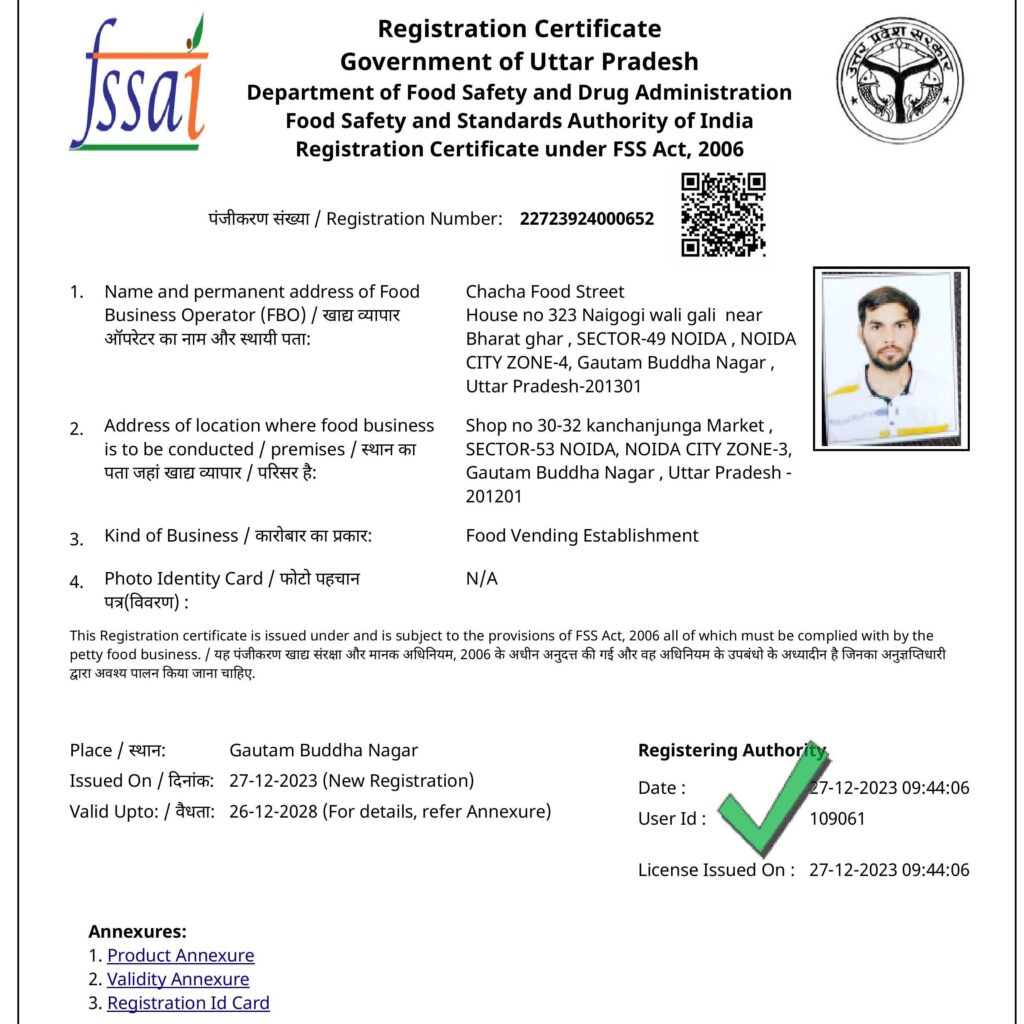
The Food Safety and Standards Authority of India (FSSAI) is a statutory body established under the Food Safety and Standards Act, 2006. Its primary goal is to ensure the safety and quality of food products in India by regulating and monitoring every stage, from manufacturing to sale. For any food business operating in India, obtaining an FSSAI license is not just a formality; it’s a legal necessity that builds consumer trust and ensures market access.
What Is an FSSAI License?
An FSSAI license is a mandatory certification for any food business operator (FBO) in India. It confirms that the business adheres to the FSSAI’s rigorous safety, hygiene, and quality standards. The FSSAI license number is a powerful symbol of trust for consumers and is required to be displayed on all food packages.
Why Is an FSSAI License Important?
Obtaining an FSSAI license or registration offers numerous benefits for both businesses and consumers.
| Benefit | Description |
| Ensures Food Safety | The license guarantees that your business follows strict food safety and hygiene protocols, which reduces the risk of unsafe food reaching consumers. |
| Legal Requirement | Operating a food business without a valid FSSAI license is illegal under the Food Safety and Standards Act. |
| Consumer Confidence | An FSSAI license assures customers that the food products they buy are safe and produced under regulated conditions, which builds brand trust and reputation. |
| Market Access | Many distributors and retailers require FSSAI certification as a prerequisite for stocking or selling your products. |
Types of FSSAI Licenses
The FSSAI licensing system is categorized based on the size and turnover of the business.
| License Type | Eligibility |
| FSSAI Basic Registration | Small-scale food businesses with an annual turnover of up to ₹12 lakhs (e.g., local vendors, small grocery stores, and home bakers). |
| FSSAI State License | Medium-sized food businesses with an annual turnover of over ₹12 lakhs but less than ₹20 crores. |
| FSSAI Central License | Large food businesses with an annual turnover exceeding ₹20 crores, or those involved in import/export, e-commerce, and other multi-state operations. |
How to Apply for an FSSAI License
The application process is designed to be clear and efficient.
1. Required Documents While the exact documents can vary, you’ll generally need:
-
Passport-size photo
-
Identity proof of the business owner (Aadhar card, Passport, etc.)
-
Address proof of the business premises (Rental agreement, utility bills, etc.)
2. Application Process
-
Determine Your Eligibility: Identify which type of license (Basic, State, or Central) your business needs based on its turnover and operations.
-
Gather Documents: Prepare all the required paperwork.
-
Fill the Application: Submit your application online via the FSSAI website or mobile app.
-
Pay Fees: The fee varies based on the type of license.
-
Inspection (if needed): FSSAI officials may conduct a physical inspection of your premises.
-
Receive Your License: Once approved, you will receive your FSSAI license number.
Key Responsibilities of an FSSAI License Holder
Holding a license comes with ongoing responsibilities to ensure compliance.
-
Maintain Standards: Always ensure your products meet the required safety and quality standards.
-
Display Information: The FSSAI logo and license number must be visible on all food packaging.
-
Allow Inspections: Be ready for periodic inspections by FSSAI officials.
-
Renew on Time: FSSAI licenses are valid for 1 to 5 years and must be renewed before they expire.
By understanding and adhering to FSSAI regulations, food businesses can not only operate legally but also build a strong reputation and contribute to a safer food ecosystem in India.
What is the main purpose of the FSSAI license?
The FSSAI license is a mandatory certification that ensures a food business complies with the safety, hygiene, and quality standards set by the Food Safety and Standards Authority of India (FSSAI). It’s a legal requirement that builds consumer confidence and ensures the food products are safe for consumption
Which type of FSSAI license do I need if my business turnover is less than ₹12 lakhs?
If your business has an annual turnover of up to ₹12 lakhs (₹1.2 million), you need to obtain the FSSAI Basic Registration. This applies to small-scale businesses like local food vendors and small manufacturers.
Is an FSSAI license required for all types of food businesses?
Yes, according to the Food Safety and Standards Act, all food business operators (FBOs) involved in the production, processing, distribution, or sale of food products must obtain an FSSAI license or registration to operate legally in India.
How often does an FSSAI license need to be renewed?
FSSAI licenses are valid for a period of 1 to 5 years. It is a key responsibility of the license holder to ensure that the license is renewed before its expiration date to avoid any legal issues.
What documents are commonly required to apply for an FSSAI license?
While the specific documents may vary, some common requirements include a passport-size photo of the business owner, identity proof (such as an Aadhaar card or passport), and address proof of the food business premises (like a rental agreement or utility bills).
